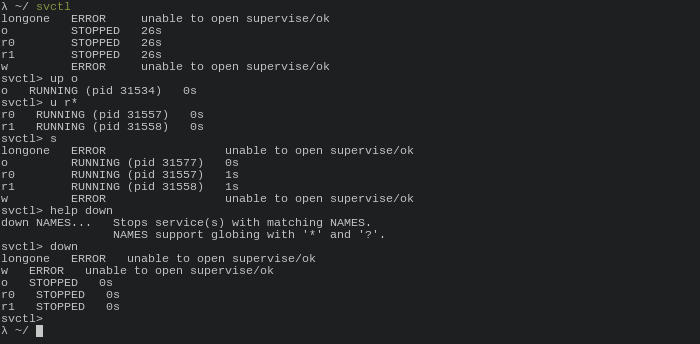https://github.com/kenjitakahashi/svctl
interactive runit controller
https://github.com/kenjitakahashi/svctl
go runit tui
Last synced: 6 months ago
JSON representation
interactive runit controller
- Host: GitHub
- URL: https://github.com/kenjitakahashi/svctl
- Owner: KenjiTakahashi
- License: mit
- Created: 2015-05-09T20:20:58.000Z (over 10 years ago)
- Default Branch: master
- Last Pushed: 2023-11-12T22:22:52.000Z (almost 2 years ago)
- Last Synced: 2025-04-13T03:58:40.279Z (6 months ago)
- Topics: go, runit, tui
- Language: Go
- Homepage:
- Size: 43.9 KB
- Stars: 12
- Watchers: 1
- Forks: 1
- Open Issues: 0
-
Metadata Files:
- Readme: README.md
- Funding: .github/FUNDING.yml
- License: LICENSE.md
Awesome Lists containing this project
README
[](https://github.com/KenjiTakahashi/svctl/actions/workflows/tests.yml) [](https://kenjitakahashi.github.io/svctl/master/)
**svctl** is an interactive [runit](http://smarden.org/runit/) controller.
## screenshot

## installation
**Note:** Binaries are available for download at [Github Releases](https://github.com/KenjiTakahashi/svctl/releases).
Otherwise, install from source:
```bash
go install github.com/KenjiTakahashi/svctl@latest
```
## usage
Typing `svctl` will show statuses of all services in current `SVDIR` and open a prompt for interactive use.
### SVDIR
In accordance with the `sv` command, `svctl` uses `$SVDIR` environment variable value as the services directory. If not set, defaults to `/service/`.
### commands
* **...** means that multiple arguments can be supplied.
* All service name arguments can contain standard globing characters, i.e. `*` and/or `?`.
* While `sv` reads only first letter (e.g. `ugdef` is a valid `up` command), `svctl` expects either just the first letter or a full name of the command.
**(e)xit / Ctrl-D** Terminates `svctl`.
#### main
`svctl` supports all standard `sv` commands, excluding `exit`/`shutdown`.
**(u)p / start NAMES...** Starts service(s) with matching NAMES.
**(d)own / stop NAMES...** Stops service(s) with matching NAMES.
**r / restart NAMES...** Restarts service(s) with matching NAMES. Waits up to 7 seconds for the service to get back up, then reports TIMEOUT.
**(o)nce NAMES...** Start service(s) once and does not try to restart them if they stop.
**(p)ause NAMES...** Sends signal **STOP** to running service(s) with matching NAMES.
**\(c)ont NAMES...** Sends signal **CONT** to running service(s) with matching NAMES.
**(h)up / reload NAMES...** Sends signal **HUP** to running service(s) with matching NAMES.
**(a)larm NAMES...** Sends signal **ALRM** to running service(s) with matching NAMES.
**(i)interrupt NAMES...** Sends signal **INT** to running service(s) with matching NAMES.
**(q)uit NAMES...** Sends signal **QUIT** to running service(s) with matching NAMES.
**1 NAMES...** Sends signal **USR1** to running service(s) with matching NAMES.
**2 NAMES...** Sends signal **USR2** to running service(s) with matching NAMES.
**(t)erm NAMES...** Sends signal **TERM** to running service(s) with matching NAMES.
**(k)ill NAMES...** Sends signal **KILL** to running service(s) with matching NAMES.
### deliberate omissions
#### exit/shutdown
I have decided not to support "destructive" commands, i.e. `exit` and `shutdown` in a third party tool. If you want to terminate `runsv` monitor completely, you should use `sv` directly.
#### sv like cli
There is nothing wrong with `sv` and `svctl` is meant to complement, not replace, it. That is why there is only interactive usage and no standard CLI. Please use `sv` for your scripting needs.